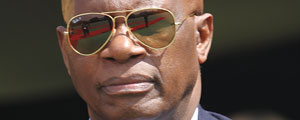
Surely, Finance minister Patrick Chinamasa is much wiser than ascribing the corruption that has riddled this economy to Western sanctions.
NewsDay Opinion
It has become routine for the Zanu PF government to blame everything wrong with this country on sanctions, but Chinamasa’s comments in Parliament this week are not only incredible, but smack of a lack of seriousness by our rulers.
Responding to a question in Parliament on Wednesday, Chinamasa claimed that sanctions had fuelled corruption.
He also claimed that the Zimbabwe’s poor ranking on international corruption indices was punitive as countries that had worse corruption were better-placed on the tallies.
“Sanctions by their nature cause corruption in that they induce businesspeople to do transactions outside normal channels,” he said.
“As long as Americans want to do business here, they will do so using clandestine channels.”
Can anything be more preposterous? Chinamasa has since his appointment as Finance minister worked to portray himself as the handyman toiling to fix many broken areas of this economy. He has won hearts in business and among diplomats who regard him as a pragmatic person. His failing, however, is the occasional quest to flow with the tide by dabbling in populist rhetoric.
- Chamisa under fire over US$120K donation
- Mavhunga puts DeMbare into Chibuku quarterfinals
- Pension funds bet on Cabora Bassa oilfields
- Councils defy govt fire tender directive
Keep Reading
This is not helpful at all as it defers government’s obligation to address an issue that is at the heart of the current crisis in the country.
Zimbabwe is ranked 156 out of 175 countries on the Transparency International Global Corruption Perception. It has also performed badly on the Ease of Doing Business index and other international investment climate rankings.
It should be stated that corruption in the country does not only predate the imposition of Western sanctions, but is a product of ruinous State policies which have created patronage and clientelism.
It is, therefore, not surprising that grand corruption in the country has featured senior politicians or their cohorts who have shamelessly become very rich in a sea of poverty.
The evidence is there for all to see from the Willowgate scandal, to the VIP Housing Scheme and the looting of the War Victims Compensation Fund.
The grand looters of State resources have remained in government where they pretend to be working for the common good. This high-level corruption had nothing to do with sanctions.
The disappearance of diamond monies in the recent past can never be explained in the context of sanctions and the same is true with the corruption among police officers, courts officers and in all service ministries of government.
Corruption has become endemic and it is now a vocation for the rich and the powerful. This is the reason Zimbabwe is ranked among the most corrupt nations in the country.
Chinamasa and his colleagues have a role to reverse this corrosive trend by eradicating corruption in high offices.
The quest to airbrush State culpability — by situating the reasons for corruption on Western sanctions -— demonstrates to would-be investors that this government is not serious about ending graft.











